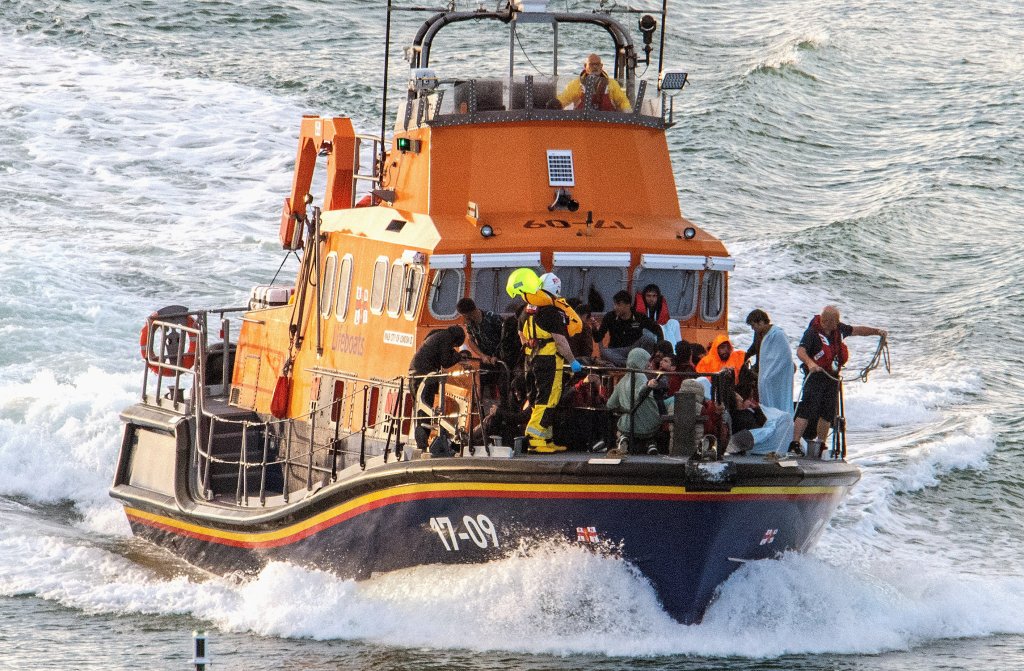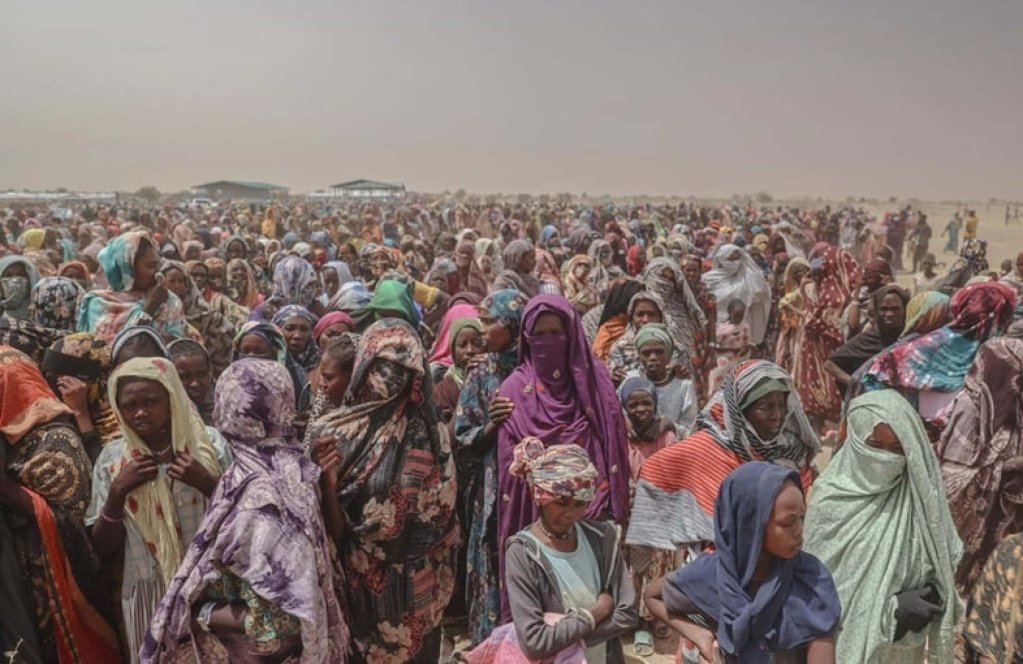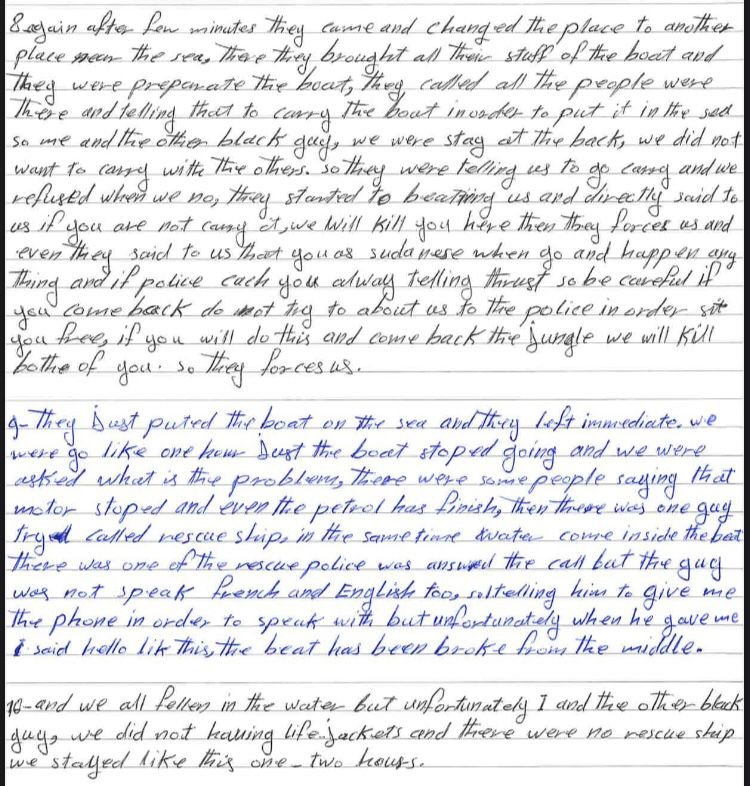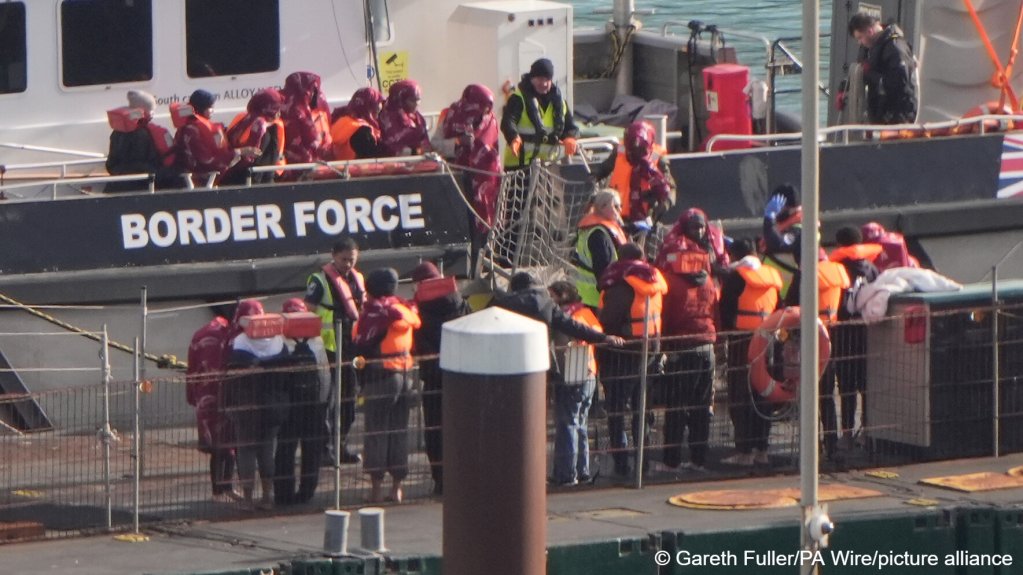A trial began in early November at the Paris Court of Justice to investigate the involvement of 10 people in a deadly English Channel crossing in August 2023. Ibrahim A., a Sudanese migrant and survivor of the shipwreck, stands among the accused. He has been trying to prove his innocence for two years.
A sudden silence permeates the courtroom. It comes after a simple question asked by the investigating judge: "What do you think about all of this?" From the defendant’s box, Ibrahim A. struggles to find the right words. From the whispering of the press to the commotion among the interpreters – time seems to be briefly suspended. The 31-year-old Sudanese national, dressed in a gray and dark-red jacket places his hands on the box's edge and presses his forehead against the window. The audience can hear him crying. After four and a half hours of trial, his nerves are on edge. "I feel like I’m a victim of injustice," he says in a soft voice. "I have been humiliated my whole life. In Sudan, I saw death before my eyes. I escaped death and misery."
"I came to Europe because here there are laws. Here, there is humanity. Yet once again, injustice pursues me," says the migrant in a strangled voice. "I wanted to build a new life. A better one than the previous one. I feel like I’m not being treated like a human being and that I don’t have the right to live like others," says Ibrahim A. "Sometimes I had dark thoughts during these two years in prison; I began thinking it would have been better to die in the shipwreck rather than survive."
Read AlsoOn the trail of migrant smugglers 2/3: Shipwreck survivor to stand trial for involuntary homicide
Ibrahim A.'s trial began on November 4 at the Paris Court of Justice. He is one of the ten suspects accused of participating in the organization of a deadly August 2023 Channel crossing toward the United Kingdom. The young man faces charges for co-piloting the inflatable boat and therefore of being a migrant smuggler. In police custody for two years and three months, Ibrahim A. has denied the charges. He now faces up to ten years in prison for manslaughter, as well as aiding and abetting illegal entry, stay or transit, with the aggravating circumstance of having committed the crime as "part of an organized group".
The heavy toll of the shipwreck of August 12, 2023
The inflatable vessel, which Ibrahim A. and 60 other migrants boarded the evening between August 11 and 12, 2023, later sank off the coast of Calais. Six people were killed and two disappeared. One of the two missing individuals was later found and identified, according to a judge at the trial. The body had been in a state of advanced decomposition when it washed up in the Netherlands. A cell phone discovered in one of his pockets allowed him to be identified. The family of the deceased person, in contact with InfoMigrants from Kabul, said they still didn’t have any news from the French authorities about the body nor about its eventual repatriation. The official death toll of the disaster has now risen to seven victims.
"The night was the most difficult moment of my life," said Fazel, a 19-year-old survivor with whom InfoMigrants spoke immediately after the shipwreck. "Everyone fell into the water. Certain passengers had life jackets, while others just had buoys. They tried to hang on to the pieces of the boat which hadn’t fallen apart. I saw several people die."

The French agency for combating organized crime (La Juridiction nationale de lutte contre la criminalité organisée) launched an investigative procedure several days after the shipwreck against four people. Ibrahim A. and a national from South Sudan, Ezekiel T., were the first to be placed in custody. The investigating judge accused them of having steered the boat in exchange for reduced rates for their own crossings. Two Iraqi Kurds were also identified as the organizers of the crossing.
The Paris prosecutor’s office didn’t distinguish between the first two suspects, who were migrants, from the migrant smugglers. "This means there aren’t 'four migrants' facing charges, but four smugglers, [...] of which only two were also trying to reach the English coast," said the prosecutor Maylis de Roeck in August 2023. Other people were arrested and placed in custody in the following months, bringing the number of people facing charges for the deadly shipwreck up to ten.
Read AlsoOn the trail of migrant smugglers 1/3: The fall of Calais trafficker Idrees G.
Numerous witnesses questioned during the trial made a distinction between those steering the boat and the migrant smugglers. One of them for example told police that Ibrahim A. had simply "given a hand" to Ezekiel T. as he steered the boat: "I repeat that these people are not smugglers. They have no money, and the smugglers use them to steer the boat."
Fleeing the massacres of Al Geneina
Originally from West Darfur province, Ibrahim fled Sudan in March 2023. He managed to escape just a few weeks before the region and its capital Al Geneina became the scene of horrific massacres perpetrated by the Rapid Support Forces (RSF). The militia is the same paramilitary group that carried out mass killings in the Sudanese city of El Fasher in late October. The paramilitary forces, led by Mohamed Hamdan Doglo, known as Hemedti, primarily targeted the Massalit minority between April and November 2023. Between 10,000 and 15,000 people, mostly Massalit, were killed in a massacre which Human Rights Watch later described as an ethnic cleansing campaign.

A Massalit himself, Ibrahim A. first fled to Chad, where his family still lives in a refugee camp. He later continued his journey to Libya. A criminal group kidnapped him as soon as he arrived. The young man told InfoMigrants from prison that he had been "beaten with sticks and tied to the iron bars of the hangar" where he was imprisoned with other migrants. The violence was repeated daily "for a week", until he fell and injured his leg. Unable to provide the ransom demanded from his family, the young man was sent to a "farm" for forced labor. He managed to escape about twenty days later. He crossed the Mediterranean and reached Calais soon after.
Read AlsoMore than 100 Sudanese refugees dead or missing in shipwrecks off Libya
Since he was arrested two years ago, Ibrahim’s horizon has been reduced to the four walls of his prison cell in Bois-d’Arcy in north-central France. He says he is trying to maintain a semblance of normality in his life behind bars by taking French lessons and working in the prison. In a letter sent in September to InfoMigrants from the detention center, the young man described a "very hard" prison life. Above all, he insisted upon his innocence.
'If you don’t carry the boat, they kill you here'
Ibrahim A. said he approached a group of smugglers at a camp on August 11, 2023, to inquire about the price of the crossing. Seven hundred euros, they told him. Yet he only had 400 euros. After initially refusing his offer, the smugglers called him back to collect the money. The young man was surprised: "I asked them, 'Why are you telling me this, after refusing me at first?'". The smugglers then led him and the group to another camp. "They were talking very loudly [...] They started firing shots."
Ibrahim said he wanted to flee at that moment, along with Ezekiel T. "But they stopped us." The armed smugglers took them to the beach and began preparing the nautical equipment. "They asked us to carry the boat with the others. When we refused, they started hitting us and said, 'If you don't carry the boat, we'll kill you here'."
Read AlsoOn the trail of migrant smugglers 3/3: Gang war shootouts on a trafficking highway
Ibrahim’s actions, which were carried out under duress according to his account, didn't hold weight with the prosecutor. According to him, Ibrahim, "had actively participated in launching the boat from the beach." The young man also initially faced charges of "criminal conspiracy to commit crimes" and "aiding the illegal entry, movement, or residence of foreigners." Yet the charge of "criminal conspiracy" was eventually dropped. "It is stated that Mr. A. agreed to work for the network, but at no point is it stated that he was an integral part of the smuggling operation," the prosecutor conceded during a hearing on November 4.

Ibrahim A. nevertheless found himself in the same dock with the seven other men accused of being part of the network the day the trial began. WIth all their eyes on him, the young man had to recount the pressure exerted by the smugglers, whose names the suspects refused to reveal. "I was very afraid at the police station. I knew if the police released me, I would face their threats," he explained to the court.
Ibrahim A. described to InfoMigrants how a smuggler had threatened him: "If the police catch you [...] don't try to tell them about us to get released: if you do that and come back to the camp, we'll kill you." During his hearing on August 15, 2024 in front of an officer from France’s anti-trafficking bureau, l’Office de lutte contre le trafic illicite de migrants (OLTIM), the young man described how a smuggler had threatened him with a weapon. "The gun was in the bag, he took it out and pointed it at us, telling us it wasn't just talk. When he threatened to kill me, the first thing that came to mind was my family, which depends on me and was going to starve to death."
The presiding judge eventually became concerned about the physical proximity in court between Ibrahim A. and the other defendants. She ordered them to be separated into two different docks to avoid incidents.
'Pursuing the Zodiac pilots is targeting the wrong people'
At the end of her questioning, the presiding judge made a distinction between Ibrahim A. and the other defendants in the courtroom. "Unlike them, you were on the boat," she acknowledged. "Like the other passengers, you were a customer. Like the other passengers, you nearly lost your life."
"He was taken into custody right after spending hours in the water and thinking he was going to die. He didn't even have a life jacket," said Raphaël Kempf, Ibrahim A.'s lawyer.
Once he was brought ashore by the rescue team, Ibrahim A. said, "I felt my body freezing. My stomach hurt because I swallowed so much seawater. Breathing was difficult. I laid down because when I would sit up, seawater would flow out of my ears and everywhere else." He was not offered access to a doctor or a psychologist before being taken into custody. "When they began asking me questions, I wasn't in a normal state; I even had trouble giving them my name," he said a year later to OLTIM.
Read AlsoCharged with saving migrants' lives – rescuers facing criminal prosecution
"The justice system is placing disproportionate blame on Zodiac pilots compared to their actual involvement in smuggling networks," said Lisa*, a member of the Captain support France collective, a group which supports migrants prosecuted for piloting boats during crossing attempts in the English Channel. "Sometimes there are brutal power dynamics and control exerted by certain smuggling networks. Yet prosecuting, arresting, and detaining migrants for two years for piloting a Zodiac is targeting the wrong people." It is also a violation of Article 5 of the United Nations Protocol against the Smuggling of Migrants, which states that anti-smuggling legislation should not target migrants themselves.

A stricter legal interpretation across Europe
Yet the legal pursuit of migrants who improvise as "small hands," or low-level intermediaries who help with human trafficking, is a growing phenomenon in Europe. Greece and Italy were pioneers in the criminalization of migrants who steered zodiac boats. The United Kingdom followed closely behind. The case of Ibrahima Bah, who was found guilty of manslaughter after the boat he was driving across the Channel broke apart, may have set a legal precedent. The young Senegalese national was condemned in February 2024 to nine-and-a-half years in prison for causing the deaths of four people who died in the disaster.
Like Ibrahim A., Ibrahima Bah defended himself in court by saying he had been threatened by smugglers. "It hurts me to see him considered a smuggler, when he is someone who left a difficult situation of poverty to take care of his family. People with bad intentions forced him to drive the boat and he is considered guilty," Bah’s sister, Hassanatou Ba, told InfoMigrants.
The criminalization trend has continued since then. The European Commission’s proposed reform of the EU Facilitation Directive, still under negotiation in Brussels, aims to extend these judicial practices across Europe. France’s revised immigration law of January 2024 toughened the penalties for those accused of piloting boats, increasing the sentence for aiding the illegal entry, movement, or residence of foreign nationals to up to 15 years in prison if committed by an organized group with at least one additional aggravating circumstance. An example is exposing individuals to the risk of death or injury, violating their dignity, or using fraudulent travel documents.
"I don't know when I'll be able to live in peace," Ibrahim A. confided a few weeks ago in a letter written from his cell. Currently in court, he concluded: "My plan was simply to reach a safe port, a country where I could stay." He now awaits his verdict: the extensive trial over the shipwreck of August 12, 2023 is due to end on November 18.
*Name changed to protect identity
